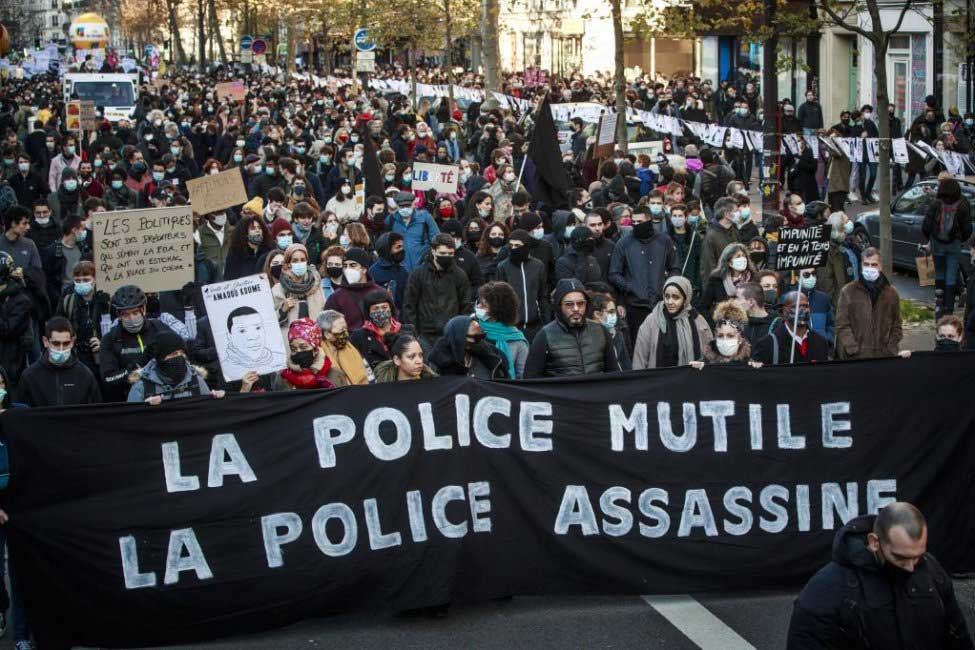

By Marc Lassalle – PARIS
The second wave of the pandemic, combined with a second month-long lockdown, are certainly far from the best conditions to organise a fight back against President Emmanuel Macron’s draconian new global security law. However, his government is suddenly being confronted with major resistance: more than one hundred thousand marched on November 28 in dozens of demonstrations across the whole country. In Paris alone, the demo was massive and even the Interior Ministry, notorious for downplaying such numbers, spoke of 46,000 people on it (200,000 according to the organisers).
The people on the streets are absolutely right to reject the new ultra-repressive security law. If approved, it would punish anyone who spreads images of police officers with the “aim of compromising their physical or mental integrity”. Of course, the terms are deliberately vague but if approved it would seriously restrict the rights of journalists, as well as the freedom of anybody to film abusive or violent actions by the police as evidence to report them.
“Towards a police state?” is the title of an analysis of this law made by the Syndicat de la Magistrature, the magistrates’ union, claiming that the law would weaken even more any democratic control on police. Gérald Darmanin, Minister of Interior and main advocate of this law, had already assured police representatives before the vote on the law in the Assemblée Nationale: “Be assured, together with the president and the prime minister, we will always be there to protect you.”
According to the NGO Reporter Sans Frontières “confronted with a journalist filming them, police-officers could presume that these images will be widely reproduced with the aim of compromising them and could therefore arrest the persons concerned in order to prosecute them for committing an obvious offense”. Indeed, Darmanin already made it clear that journalists wishing to cover demonstrations should accredit themselves with police authorities, another obvious violation of the rights of the press.
Two recent episodes of police methods make it clear why everybody should defend existing freedoms. The first came on November 24, when police violently expelled a hundred migrants who had pitched tents in the Place de la République, in central Paris. Some migrants were brutally thrown to the ground, other dragged out of their tents like garbage, beaten with batons and tear gassed. Even Darmanin felt obliged to call these images “shocking”. Yet they have been the everyday treatment of migrants and Roma for months, expelled in thousands from ramshackle camps all around Paris and elsewhere.
The violent assault by four policemen against Michel Zecler, a music producer, just because he was not wearing a facemask, accompanied by racist insults, was another reminder that police brutalities are not isolated events. Without these images, these assaults would have remained unknown or unproven and the police would benefit from total impunity. In June, responding to the Black Lives Matter protest in the USA, twenty thousand people marched in Paris to denounce this systematic use of state violence, like the death by asphyxiation in police custody of Adama Traoré in 2016, the rape of a young man, Théo, with a police baton, requiring surgery, both in Aulnay-sous-Bois to the north Paris etc.
The new law on global security is just the latest in a long list of repressive measures, often rushed through in the wake of terrorist attacks: 30 such laws in the last 20 years. One month ago, the brutal murder of Samuel Paty, a teacher, in a terrorist attack, shocked the whole country. Using this as a pretext, the government, pretending to defend “freedom of expression”, a sick joke considering what they themselves are doing, attempted to reinforce the arsenal of security laws and to prepare brutal repression of any protests.
The same happened with all previous presidents: with Jacques Chirac, then with Nicolas Sarkozy, and with François Hollande. Apart from reinforcing a police state, these measures have also a more short term goal: they are aimed at convincing the right-wing voters, and even supporters of reactionary Rassemblement National (the former FN), that Macron is pursuing a vigorous right-wing policy, and that therefore they should vote for him in the next presidential election due in 2022. It is not a coincidence that all major ministers of the present Macron government, were previously figures from the right wing Gaullist party the UMP (Union pour un mouvement populaire), most notably Jean Castex (prime minister), Gerald Darmanin (Interior), Bruno Le Maire (economy).
Another recent law proposed by the government, against “separatismes” (anti-republican ideas), is really another islamophobic law, suggesting that Islam is inevitably behind insecurity and terrorism. Together with this there has been a widespread witch-hunting media campaign, encouraged by the government, denouncing halal shelves in supermarkets as signs of separatismes, plus attacks on “islamo-leftism” as a dangerous gangrene in universities, or closing down the Collective Against Islamophobia (CCIF), an organisation defending victims of anti-Muslim attacks.
While the government is now offering minor symbolic changes in the law, the trade unions are right to demand the abandonment of the whole project. Solidarity between all the victims of racism and the organised working class is essential. Faced with a new wave of major sackings in important companies like Renault, planning to close down its Flins factory, its major French site, with a loss of 2,574 jobs, the new law will tomorrow be used against workers and youth on the picket line, in occupations or the streets, defending their jobs and their democratic rights.